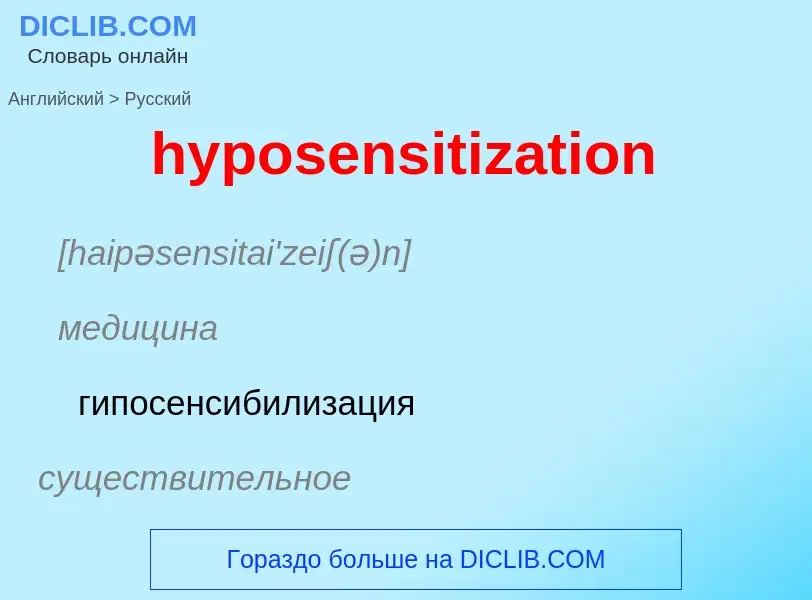ترجمة وتحليل الكلمات عن طريق الذكاء الاصطناعي ChatGPT
في هذه الصفحة يمكنك الحصول على تحليل مفصل لكلمة أو عبارة باستخدام أفضل تقنيات الذكاء الاصطناعي المتوفرة اليوم:
- كيف يتم استخدام الكلمة في اللغة
- تردد الكلمة
- ما إذا كانت الكلمة تستخدم في كثير من الأحيان في اللغة المنطوقة أو المكتوبة
- خيارات الترجمة إلى الروسية أو الإسبانية، على التوالي
- أمثلة على استخدام الكلمة (عدة عبارات مع الترجمة)
- أصل الكلمة
hyposensitization - ترجمة إلى الروسية
[haipəsensitai'zeiʃ(ə)n]
медицина
гипосенсибилизация
существительное
медицина
снижение восприимчивости к аллергенам
[haipə'sensitaiz]
глагол
медицина
понижать восприимчивость к аллергенам
медицина
специфическая гипосенсибилизация
ويكيبيديا

Allergen immunotherapy, also known as desensitization or hypo-sensitization, is a medical treatment for environmental allergies, such as insect bites, and asthma. Immunotherapy involves exposing people to larger and larger amounts of allergen in an attempt to change the immune system's response.
Meta-analyses have found that injections of allergens under the skin are effective in the treatment in allergic rhinitis in children and in asthma. The benefits may last for years after treatment is stopped. It is generally safe and effective for allergic rhinitis, allergic conjunctivitis, allergic forms of asthma, and stinging insects. The evidence also supports the use of sublingual immunotherapy against rhinitis and asthma, but it is less strong. In this form the allergen is given under the tongue and people often prefer it to injections. Immunotherapy is not recommended as a stand-alone treatment for asthma.
Side effects during sublingual immunotherapy treatment are usually local and mild and can often be eliminated by adjusting the dosage. Anaphylaxis during sublingual immunotherapy treatment has occurred on rare occasions.
Potential side effects related to subcutaneous immunotherapy treatment for asthma and allergic rhinoconjunctivitis include mild or moderate skin or respiratory reactions. Severe side effects such as anaphylaxis during subcutaneous immunotherapy treatment are relatively uncommon.
Discovered by Leonard Noon and John Freeman in 1911, allergen immunotherapy is the only medicine known to tackle not only the symptoms but also the causes of respiratory allergies. A detailed diagnosis is necessary to identify the allergens involved.


